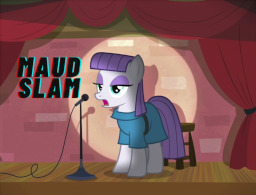
Stanza 4
Two broken pencil stubs lay hidden in the dirt. Maud reached into her bag to pull out a third. The taste of eraser and wood coincided with the smell of graphite, but while normally she would have found the smell just a bit too artificial for her liking, she put it out of her mind and continued to scribble.
A raven watched her. She wasn’t sure if it was the same one that had greeted her. She barely glanced at it, her pencil rolling furiously around her tongue. She was biting so hard into it, she nearly popped the eraser off the end, a mistake that, as with the two other stubs, had resulted in her turning and spitting the pink bits to her side, where they had landed in a globular heap next to the rain barrel.
The raven flapped its wings and flew away. The resulting wind was enough to ruffle her papers. Maud stomped her hoof down on them, accidentally snapping the pencil in her mouth in the process. She sighed, spat out the eraser, placed the broken item in the other pile, and reached into her bag for a fourth.
She was still searching when she heard the door to the cafe open. Starlight’s worried voice drifted around the corner, before the unicorn herself appeared. “Maud?” she asked, her eyes narrowed with confusion. “What are you doing out here?”
“Revising,” Maud said. She still had not found a pencil. She could have sworn she’d brought more than three, but…
“Revising? Oh.” Starlight scuffed a hoof through the dirt. “Uh, is that what you’ve been doing all this time, then?”
“Yes.” Maud heard her voice tremble. She was thankful that she was turned away, so that Starlight wouldn’t see her grit her teeth just a bit harder.
“And… the coffee and bagels?”
Oh, yes. She did promise to get the girls those things. “They’re inside. On the table.”
The matter resolved, she resumed her search, digging through each compartment of her bag, making sure too that her papers wouldn’t flutter about.
Actually. Starlight might have an extra pencil on her. I probably shouldn’t have told her to leave…
As she was thinking this, Maud turned, disappointment preceding her. It was with great surprise, then, marked only by the slight twitching of her eye, that she saw Starlight still standing before her.
“Maud,” Starlight began. She took a step forward, then stopped, tilting her head. “You know it’s the fourth performer’s turn, now. Is everything okay?”
“Everything’s fine,” Maud said. But she knew her voice had trembled again. She looked behind at her papers.
Starlight came closer. She looked past Maud at the papers, too. “Those look like some awfully heavy revisions, Maud. I thought you were satisfied with what you had.”
“I was. But then Elegy had some good ideas and—”
“Whoa, whoa, hold the phone. Elegy? Maud, what was she doing looking at your stuff? That’s gotta be in violation of some sort of rule!”
Maud was quiet for a moment, considering. Then she said, “She had some good suggestions.”
Starlight looked at her. Then her eyes traveled to the broken pencil stubs. The papers, meanwhile, fluttered angrily under Maud’s hoof.
Starlight brushed the stubs aside and sat down next to her. “Can I see them, at least?”
Maud nodded. She grabbed her poems and carefully passed them over to Starlight, who took them in her magic. Under that light turquoise glow, the series of scribbles and scratches looked less like the product of intense work and thought and more like a tangled web of creepy crawlies and other undesirables.
“They were good suggestions,” Maud repeated as Starlight began to read. “I wouldn’t have made them if I hadn’t thought the poems needed them.”
“Are you sure? I mean, you changed this word to ‘grandiloquent.’ I live with Twilight, but even I’m not sure I know what that means.”
“It describes the use of excessively flowery, fancy words. I used it to describe a metamorphic rock.”
“Okay, I can see that, but—well, look, now you’ve got lines that stretch across the page. I thought you were into more minimal stuff?”
“I was. I am. But this is better. That’s what Elegy said. That’s what all the past winners have in common.”
“The winners? I thought you didn’t really care about winning!”
“This is what the judges want poets to write.”
“But what about you, Maud?” Starlight pushed the papers back into her hooves, her magic dissipating. “What do you want to write? This overly sentimental, archaic nonsense that somepony with too much of a stick up their butt calls poetry?” Maud tried to respond, but Starlight pushed ahead with one other remark. “These poems don’t even sound like you anymore!”
All the justifications Maud had been quietly generating in her head gave out. Her mind froze. It seized upon those words, trying to dissect them, crack them open and find the fatal flaw. But it found it could not.
Her jaw slackened, and her grasp on the papers loosened ever so slightly. An errant breeze alerted her that they were in danger of flying off, but she made no move to correct herself.
Then immediately, both ponies heard something screech nearby, and that same something landed hard on the ground in front of them, fluttering its wings. It was the raven, and it had a juicy worm sticking out from its beak.
The wind that it generated, combined with the breeze, gushed over the both of them. Maud realized too late what was about to happen, and Starlight, too startled by the bird, could not help her. The wind grabbed ahold of Maud’s poems and shuffled them up in a spiral, before unceremoniously dropping them into the nearby rain barrel.
Maud was quick enough, however, to nab one of them with her teeth just before it fell in. The raven blinked, cawed again in what might have been a laugh, then flew off.
“Oh, no!” Starlight cried. She rushed over to the barrel and tried to retrieve the papers. But Maud could already tell it was too late; the tan parchment was completely soaked through, and all the letters dripped in a garbled mess down the face of each page. Desperately, Starlight tried to shake them dry, but all she did was throw water everywhere.
Maud watched as all her chances drowned right before her eyes. She slowly sat down on her haunches. She thought she would never move again, or at least anytime soon.
“That… that can’t have been all of them,” Starlight said breathlessly. She looked like she was on the verge of tears, though Maud couldn’t quite understand why; after all, it wasn’t her work that had been so sloppily baptized, was it? “Maud, was that all of them?”
“Hmm,” Maud intoned. She glanced down at the sheet she’d been able to grab. “No.”
“Oh, thank Celestia! That means you can still use it!”
Maud turned her head and blinked at Starlight, who frantically waved her hoof at the sheet. “But I haven’t even read it over yet,” Maud said.
“It’s the only one you’ve got!”
“But it’s not the one I wanted to read.” Maud looked down at the sheet. “I can always just drop out. Let the judges know—”
“No, no, absolutely not!” Starlight came over and placed a hoof on Maud’s shoulder. “Maud, you’re here for a reason. You’re here to share what you’ve written! Why risk throwing it all away?”
“Because now I know for sure that I’m not going to win,” Maud deftly replied.
“And since when did you care about winning this silly thing?” Starlight paused, then took a breath. “Maud, I get that Elegy got to you. And I’m sure you think she’s being helpful. But she’s not. She’s just trying to get your confidence down, trying to get you out of the competition. That means she knows you’re a talented poet! And I’d bet any number of bits that what you’ve got with you is ten times better than whatever she can pull.”
Starlight removed her hoof. “But that means you have to try, Maud. Look.” She lit her horn, and tugged the sheet out from under Maud. She held it in front of her. “I know this poem doesn’t have any of the stuff Elegy said your poems should have. But that makes it truer to you, don’t you think? And while I don’t know a whole lot about poetry, I believe that most importantly it has to be true to you. Otherwise, what is it if not just a bunch of fancy words?”
Maud tried looking directly at her, but Starlight simply waved the poem in her face, blocking her view. So Maud looked at it.
It was short. It had none of the flair, none of the fanciful language or imagery that Elegy had so convincingly said was to the judge’s liking. But… undeniably, Maud sensed herself in it, herself and all of her flaws, and also all of her inner beauty. It was a poem. No, it was her poem.
“... Okay, Starlight,” she said quietly.
“Okay… as in…”
“I’ll go up there. And I’ll share this poem myself.”
“That’s the Maud I know!” Starlight grinned, but her expression quickly became a determined one. “Now, come on. Hopefully we won’t have missed your turn.”
She handed the poem back to Maud, who slipped it snugly into her bag.
They rushed back inside, briefly passing the tray of bagels and coffee. Maud asked, “What about them?” But Starlight simply shook her head. “Trixie will make do, trust me. This is more important.”
They trotted quickly but also silently down the stairs, and did not get far before they heard a familiar voice transcribing page to air. Maud saw Elegy on the stage, and for a moment, was struck by the scene: the judges, other performers, and the rest of the attendees all watched in stark amazement, their jaws agape and their eyes fixated on the bard-pony before them. Even Trixie watched, her earlier remarks about Elegy’s character apparently having been forgotten.
Elegy’s voice swelled as the two returned to their table. It was impossible to ignore the sonorous way she recited her poem, or how compelling was her language, how terrifically terrifying were her conjurations. Maud couldn’t understand half the words she said, but she had a sinking feeling that it didn’t matter; Elegy had successfully won the crowd over, won the judges over. The feeling of doubt began to creep back into her heart.
But then Starlight nudged Maud. Maud looked down at her hoof, and found it was pointing at her chest. Starlight gestured to it twice, then once to the poem, then looked up at Maud, checking to make sure she understood.
She did; and just in time, too, because wealthy applause erupted just as Elegy finished. She had a victorious grin. It remained as she exited the stage.
“Thank you, Elegy, for that wonderful performance,” First Draft said once the applause had died down. She seemed to want to say more, but chewed on her lip, seemingly confused—or perhaps still coming out of that haze. “Now, then. Onto our next and final performer. Please welcome to the stage: Maud Pie.”
“You’ve got this!” Starlight whispered to her.
The steps leading to the microphone and podium seemed impossibly long, and Maud could feel everypony’s gaze on her. They all seemed distant and judgemental, no doubt riding still on the high of that last performance. In the back sat Elegy Mixer, and Maud could feel her feral grin settle on her, silently telling her that it was of no use.
But Maud swallowed that feeling of dread. The judges waited patiently for her to arrive.
She reached the podium and paused. Starlight and Trixie were both looking at her, the latter finally breaking out of her reverie to nod encouragingly. Maud reached around and took out her poem, placing it onto the wooden surface. She read the title, then glanced at the lines, then stopped; could she do this? Did it even matter?
“Whenever you’re ready,” First Draft whispered.
Now or never.
“My poem,” Maud said, returning to the top of the page, “is called: The Pebble.”
For the most part there was silence, sweet and merciful. But in the back, somepony snickered. Maud already knew who it was, but she fought to push her out of her mind. She took another deep breath.
Then, she began to read:
Fairy pink
A pebble
Lies waiting in
The shingle clast
Blue veins
Crystalized into quartz
A touch warmer than limestone
You tell me your name
Like sweet rock candy
Laughing as you bounce
From hoof back to the clastTo find you again I have
To sift through the others
But they try to help
Moving and sifting
Accepting my hoof though it is not of stone
Until you appearWhen it is my turn
I find a lilac and blue pair
And though both are cracked
The line drawn down the middle
A healed-over scar for two
It is like the pile of pebbles
Knows and departs
When it is us three it
Feels rightMaybe that’s how it always is
On beaches or in caves
Where there are the recollections
Of old stones
Old faces
NamesBut that’s okay
As I carry you all I crumble
Happily
NowWe are all
Pebbles
Maud didn’t let out a breath as she backed away from the podium. In fact, no other sound escaped or accompanied her, the page of her poem fluttering against her coat. But what she was aware of, as she made her way back to her seat, was the sound of thunderous applause, first coming from the table, and then from the judges, and then, just as she sat down, from all across the room..
“You were amazing, Maud!” Starlight exclaimed. “I told you that poem was going to be great!”
“I agree,” Trixie said. “Seriously, if those judges don’t pick you for the winner automatically, then they don’t know what they’re doing!”
Maud smiled at them. “Thank you, girls.” But though her heart was light, there still remained some lingering nervous air in her.
The judges were the first to cease their applause. They stood and shuffled onto the stage, with First Draft stepping up to the microphone. “Thank you, evercreature, for your wonderful performances,” she said. “Right now, the judges will be convening in the back to evaluate your performance, and in a short while we will return to announce the winner of this year’s Scribble and Quibble Awards. But regardless of who that ends up being, we want you all to know that, to us, and to everyone else in the audience, you are all poets.”
As they disappeared backstage, the word was left ringing in Maud’s head. Gradually, a smile grew.
Time passed unaccounted. Maud’s attention was instead captivated by Trixie darting upstairs and returning with three fresh bagels and coffees, and also by some of the members of the audience coming up to her and complimenting her poem. One Yak was particularly emotional, crying in a deep voice that he now longed to find his own pebble one day. Maud assured him he would.
Once the bagels had been half-finished and the coffee drained, the judges returned. Instantly the room clammed up, for their faces were solemn. First Draft stepped up to the microphone and cleared her throat, the sound echoing across the entire room. Inky Quill and Red Rhetoric darted back behind the curtain.
“We have come to a decision,” she said, her eyes sweeping over everycreature. The curtain moved, and the others re-emerged, hoisting between them the golden trophy itself, the Scribble and Quibble Award. They set it down just off-stage, then waited beside First Draft.
“The winner of this year’s Scribble and Quibble Award goes to…”
And what a pause it was; what a space! Every thought and feeling was condensed into it. Maud felt herself leaning forward, a cold anxiety shooting through her, like the time she’d seen that rock tumbling towards Pinkie Pie. Consciously, she knew that the pause was but a breath, a butterfly’s flapping, and yet in it, time fell away, meaning fell away, until all that was left was a pregnant waiting
“... Elegy Mixer!”
The audience awoke once more with applause and cheers. Maud sat back in her chair, hardly noticing the shocked and sympathetic looks that Trixie and Starlight gave her.
And yet, she did not think she felt sick, or shocked, or even upset. A breath escaped and relieved her, and, after a moment, she joined in, clapping with surprisingly just as much enthusiasm as anyone else.
Elegy pranced onto the stage in an instant. Her horn lit, and she pulled the award toward her. The sudden movement caused First Draft to turn the microphone her way, and as Elegy danced past her, the microphone caught her saying, “But was there any other doubt?”
First Draft frowned, as did the other two judges. “As a matter of fact,” said Red Rhetoric, the mic also picking his voice up, “there was.”
“You and another contestant were neck-and-neck,” Inky Quill added. Her voice betrayed her displeasure with Elegy’s attitude.
“What?” Elegy exclaimed. “Well, who was it? You’ve got to tell me!”
First Draft turned away and cleared her throat again. “We’d like to announce the runner-up,” she said into the microphone. “The second-place finisher for this year’s contest is… Maud Pie!”
A hush—broken then by Starlight and Trixie furiously howling and clapping. Their enthusiasm spread, and the rest of the audience joined in. Propelled by her friends’ and strangers’ hooves alike, Maud stumbled onto the stage before she could even blink. Her head felt like it was in a cloud.
“Congratulations,” First Draft said, but Elegy interrupted her.
“Maud?” She stood protectively in front of the award, glaring at her, then at the judges. “How? All she did was write a stupid poem about a rock!”
“A pebble,” Maud automatically corrected. “Rock is a general term. Pebbles are—”
“I don’t care! How can you possibly say she could come even close to my quality of work?”
“Actually,” Inky Quill said, looking directly at Maud and smiling, “she would have won.”
Maud blinked. Elegy gaped. “She… would have?”
“Oh, yes,” Red Rhetoric said. “We quite enjoyed her poem, you know. Unfortunately, because it wasn’t the poem she’d initially submitted with the reservation, we had to dock a few points. Next year, though…” He winked at Maud.
“B-but that’s impossible! What about my form? The imagery? The language? The necessary ambiguity, the-the—” And when she ran out of things to say, Elegy shook her head and stomped her hoof. “How could I have almost lost to somepony who doesn’t even know the first thing about writing good poetry?”
Out of the corner of her eye, Maud saw Trixie and Starlight stand, glowering. Elegy was looking at her with a half-sneering, half-still-befuddled expression. The crow-feet around her eyes mocked her. Backhanded compliments waited behind flashing teeth and tongue.
And yet, looking at her, thinking about what she said, Maud didn’t feel a thing.
“You’re right, Elegy,” she said.
“Exactly! I’m… what?!”
“You’re right.” Maud pointed at the Scribble and Quibble award, which, despite the prevalence of purple lights, seemed to shine just a bit dimmer, like mere topaz. “I don’t know what makes a good poem. Not really. You do, though, and that’s why you won.”
Elegy stared at her silently, so Maud continued, “But I do know a lot about rocks, and about family, and friends.” She looked back at Starlight and Trixie. She smiled at them, before looking back at Elegy. “So yes. It’s true, I don’t know anything about writing a good poem. But I do know what poetry means to me, and what my poems are about. I guess that’s enough.”
“Well said, Maud Pie,” First Draft said. “Miss Elegy, while we commend you for your excellent poem, do be aware that gloating will not be tolerated at these kinds of events.”
“B-but that’s—and I—the award—”
She was saying more, but frankly, Maud didn’t care. She nodded to the three judges, then trotted off stage, back to the table, where Starlight and Trixie were waiting for her.
Starlight stepped forward. “Maud…”
It wasn’t quite a question, but Maud understood. “I’m okay, girls.” She glanced at the clock that hung just to the side. “We’d better get going. Don’t want to miss the train.”
They grabbed their bags and the leftover bagels and began to leave. Maud could still hear Elegy spluttering, and she saw Trixie unable to resist blowing a raspberry in her direction. A few parting goodbyes from newly made acquaintances joined them up the stairs before vanishing into the evening air.
And just like that, the slam contest was over. It had lasted only a few hours, yet felt like more. Maud breathed in the cool night, smelling strange sediments from someplace unknown.
Starlight sidled up to her. “It’s a shame you didn’t win, Maud. I really thought you would have.”
“Aw, come on, Starlight,” Trixie said, taking up the other side. She was grinning. “Second place isn’t that bad. And neither is showing up that showmare. Ooh, I wish I had brought my camera! Priceless!”
“You’re not too upset, are you?” Starlight then asked.
Maud didn’t immediately respond. Instead, her mind wandered back to the poem she’d read, to the words on the page, the weight they carried, the truth. Herself made real in words.
She looked at Starlight and smiled once more. “No. Not at all.”
The three of them headed towards the train station, hearts full of something warm and pure. Watching them was the raven, its red beady eyes curious, its beak twisted into some attempt at a smile. Then it flapped its wings, twice, took off, and became one with the approaching darkness.


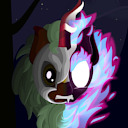

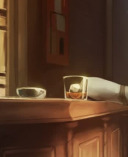

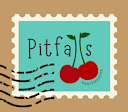
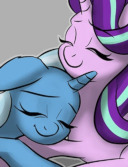


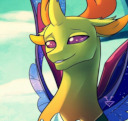
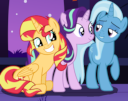




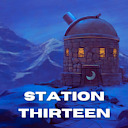


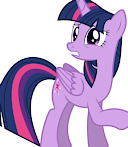
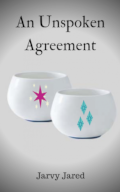
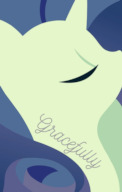
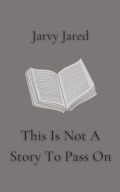
10491451
Especially coming from a pony who’s mostly just emotionless
I really wished that Maud would have won first, but good story
I liked the variety of creatures in the audience!
10491469
The writer who tries doesn't always win, but in some respects, in trying, they have won the only thing that matters. I'm glad you enjoyed!
10491752
Thank you, I did, as well!
Beautifully written! Wonderful message about being confident in your own method as well, do I spot your inner reviewer showing through with this story? Haha
Also your writing style is very poetic and I love it
10491891
I think that's a fair assessment! This story does seem to have arisen out of some of my thoughts in the reviewing process, but inevitably about writing in general. I guess that's just the thematic motif I tend to shoot for with these stories - an assessment of deeply personal things.
Glad you enjoyed!
What a wonderful story! I loved the message of making something that's true to you, even if it may not look like it's going to be a 'winner'. I especially enjoyed Maud's poem. So simple yet so beautiful, so powerful. Keep up the good work!
10492842
Thank you! I'm glad you enjoyed! (And I also enjoyed writing Maud's poem, and though it took a bit to get it to sound right, I think it's definitely something she'd write for herself.)
Not bad, but I'm a little bit confused about the premise. If the poem for the contest was submitted in advance, why is Maud even bringing other poems? If it was submitted in advance, how would revisions be permitted? And wouldn't the judges already have a copy? In fact, wouldn't there be programs or something with it printed, especially since this is apparently a prestigious contest?
Also, I'm a bit disappointed that only Maud's substitute poem gets any quotation. Having the effect of the poems described to us isn't as satisfying as experiencing it for ourselves. That said, good poetry is damn hard, so it's perfectly understandable to limit the range. It might have been better to have had Starlight and Trixie discussing their impressions of the other poets' works to begin the intermission scene, to give the descriptions a little more immediacy and context.
10493817
Hey, thank you for your comment! I agree that the description of the other poems wouldn't have been as strong as having the poems written in actuality. Unfortunately due to certain constraints of the contest, I felt I had to compensate by having that kind of description instead. What I wanted to do with that was have Maud connect the poems to herself, to show that poetry isn't a bunch of fancy words, but the experience of remembering something you haven't remembered in a while, or ever.
I understand the other criticisms, too. If I had a little more maneuvering room (and probably about 2000 more words allowed) I would have developed and addressed them a lot better than I did here. I did try, however, to bring them up and make them relevant: Maud says, in Stanza 2, that she brought extra poems because she liked having them close. That ended up aiding her in the end when she found herself without poems. Revisions would not be permitted, technically - that was a lie on Elegy's part. As for if the poems would have copies in pamphlets - not exactly? The judges would have copies, of course - that's part of the RSVP process. But because this was more performance than poetry sharing, the rest of the audience would not know what the poets were bringing. That, I admit, is not a strong reason in and of itself, but word constraints and chapter breaks meant I had to sacrifice the full development. I apologize for that.
But thank you, again, for your feedback!
Very nice and quite in-character.
10496536
Thank you! I'm glad you felt it did Maud justice.
REVIEWED!
10524314
I left a comment on the review itself, but I also want to extend my gratitude here, as well.
Hello hello.
As you know, this story won first place in the Change of Pace contest. It placed very highly for most of the judges, and I think the main reason for this was how well the story handled the restrictions of the challenge. Whilst other stories often struggled with pacing or dealing with the breaks, either dragging on or needing to pad the story in places, this story very well handled the set-up of the story, illustrated the conflict, built on that set-up, and then provided a meaningful conclusion within those restrictions without them really ever being noticed.
Some of us were less than inspired by the content of the story itself, and I'd be lying if I said that I myself was terribly invested in Maud and her poetry (I don't actually like poems), but by managing the restrictions of the contest well it allowed what was enjoyable about the story to shine quite well, particularly compared to other stories that might grab our attention more, but were hampered by other issues.
The writing and tone were very close to that of the show, which whilst not a requirement to win, was a big talking point amongst the judges and was of particular interest to myself, since the show pacing was what I based the contest off of. I think if there were a quibble I had it'd be Maud's voice... obviously getting her internal monologue was important, but it at times felt at odds with her demure and at times emotionless attitude in the show. I felt that the conclusion was strong and the conflict was also well presented.
The contest itself was quite hard; very few stories didn't have noticeable issues that arose from the strict length requirements and break points, but because this was one of the few stories that managed these restrictions well, I think it allowed the story to position itself compared to its competitors very favourably and that, I think, is to this story's credit.
10560156
I'm glad you were able to comment! I recognize that, as a standalone story, this one has a few clinks to the mix. In part that's just because of the nature of the contest, but I must express some desire to have found a way to overcome the limits and still tell a fully realized story. As such, some things had to be sacrificed for want of going over the word counts, though I did try my best not to hurt the story more than necessary.
Maud being Maud, it was hard to write her as a protagonist without having to give her something more to get people to root for her. Which is why I essentially made her a bit more "emotive". It was a rather necessary addition to her character that made the story move, and while, yes, it's different, I hope I was at least able to convince the reader to follow along all the same.
I recognize that the conceit of poetry is difficult to get people to engage with in storytelling, so I appreciate you still giving the story a chance. I had a lot of fun with this contest, though! And I honestly think it helped me come up with something as well-realized as this - I knew this story from beginning to end almost immediately upon conception, which is rarely ever the case for me.
An oddball ghost happened across your fic and read it. Have a review!
11236356
Thank you! I shall read and comment on it shortly.